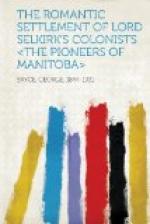Certain signs of coming trouble might have pressed themselves upon Governor Semple. He had eyes but he saw not.
The Indians, it is true, with their reverence for King George III., and showing their silver medals with the old King’s face upon them, were disposed to take sides with the British Company. This may have confirmed Semple in the tyrannical course he had followed, but had he studied the action of the free traders it might have opened his eyes. Just as certain animals of the prairie exposed to enemies have an instinctive feeling of coming danger, so these denizens of the plains felt the approach of trouble, and with their wives and half-breed children betook themselves—bag and baggage—to the far Western plains where the buffalo runs, and remained there to let the storm blow past, to return to the “Forks” in more peaceful times.
Lord Selkirk, Lady Selkirk, with his Lordship’s son and two daughters, were on the other hand drawing nearer to the scene of conflict, as they came to Montreal in the summer of 1815. In the spring Lord Selkirk started westward to see the vast estate which he possessed, but alas! only to see it in the throes of division, of excited passion and of bloody conflict, and to face one of the greatest catastrophes of new world Colonization.
CHAPTER IX.
Seven Oaks massacre.
Semple’s course is on trial. Self-assertion and dictation bring their own penalty with them. That so experienced a leader as Colin Robertson, who had been in both Companies, who knew the native element, and was acquainted with the daring and recklessness of the Nor’-Wester leaders, hesitated about demolishing Fort Gibraltar should have given Governor Semple pause. Ignorance and inexperience sometimes give men rare courage. But while Semple was self-confident he could not be exonerated from paying the price of his rashness.
Undoubtedly the Governor knew that the “Nor’-Westers” after their aggressiveness during the year 1815 were planning an attack upon Fort Douglas and upon the Colonists. Letters intercepted by the Governor acquainted him with the fact that an expedition was coming from Fort William in the East to fall upon the devoted Colony; also a letter from Qu’Appelle written by Cuthbert Grant, the young Bois-brules leader, to John Dugald Cameron, stated that the native horsemen were coming in the spring from the Saskatchewan forts to join those of Qu’Appelle, and says the writer, “It is hoped we shall come off with flying colors, and never to see any of them again in the Colonizing way in Red River.”
The evidence in hand was clear enough to the Governor. He expected the attack, and as a soldier he took action from the military standpoint in destroying the enemy’s base in levelling their Fort Gibraltar. But on the other hand there was no open war. The forms of law were being followed by the Nor’-Westers, whose officers were magistrates, and who held that by the authorization of the British Parliament the administration of justice in the Western Territories was given over to Canada. The decision afterwards given in the De Reinhard case in Quebec seems against this theory, but this was the popular opinion.




